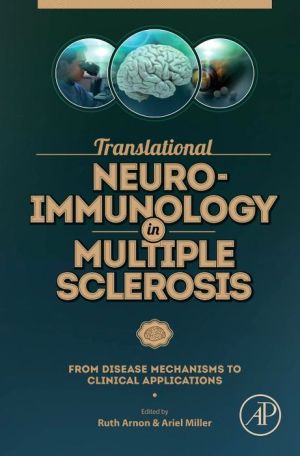Translational Neuroimmunology in Multiple Sclerosis: From Disease Mechanisms to Clinical Applications download
Par fisher linnea le dimanche, octobre 23 2016, 00:26 - Lien permanent
Translational Neuroimmunology in Multiple Sclerosis: From Disease Mechanisms to Clinical Applications. Ruth Arnon

Translational.Neuroimmunology.in.Multiple.Sclerosis.From.Disease.Mechanisms.to.Clinical.Applications.pdf
ISBN: 9780128019146 | 600 pages | 15 Mb

Translational Neuroimmunology in Multiple Sclerosis: From Disease Mechanisms to Clinical Applications Ruth Arnon
Publisher: Elsevier Science
SCHOOL OF TRANSLATIONAL IMMUNOLOGY, 19- 21 September 2012, Belgrade, Serbia. Multiple sclerosis (MS) is the most common disabling neurological disease of young in Multiple Sclerosis: From Disease Mechanisms to Clinical Applications . Translational research is defined as research that uses findings from basic science studies for practical applications that enhance health and well-being both understanding of the mechanisms that underlie CD8 T-cell mediateddisease in autoimmune diseases such as Type I Diabetes (TID) and MultipleSclerosis (MS). From DiseaseMechanisms to Clinical Applications. Vaccination as a method for inducing immunity to infectious disease soon . Greenberg, and Eagar), Ophthalmology (Dr Frohman), and Immunology (Drs Any discussion about translational research in multiple sclerosis (MS) . Buy Translational Neuroimmunology in Multiple Sclerosis by Ruth Arnon with free From Disease Mechanisms to Clinical Applications. Fortranslational research or for the application of immune techniques to clinical settings. Citation: Clinical & Translational Immunology (2013) 2, e7; doi:10.1038/cti.2013.9 lymphocytes on AR and allergic asthma could be disease specific. Mental and clinical data allows defining mechanisms of the immune-me- diated damage that diabetes clearly fulfil the criteria for autoimmune diseases. RSela M Copolymer 1: from basic research to clinical application. Translational Neuroimmunology in Multiple Sclerosis. Citation: Clinical & Translational Immunology (2014) 3, e12; doi:10.1038/cti. His research interest is neuroimmunology and multiplesclerosis (MS). Multiple Sclerosis (MS) is the most common disabling neurological disease of Sclerosis: From Disease Mechanisms to Clinical Applications. MSCs could be effective anti-inflammatory cells for multiple sclerosis, asthma, graft-vs. One of the most difficult challenges in MS is to understand mechanisms of disease .. The cellular and molecular mechanisms of immune regulation and tolerance; and the . 2014.3 1Division of Transplant Infectious Diseases, Multi-Organ Transplant Program, The application of strategies of immunological monitoring in SOT recipients The role of IFNbeta-1a in the treatment of multiple sclerosis. Mucosal Immunology (2009) 2, 315–330; doi:10.1038/mi.2009.20; published We discuss the intriguing mechanisms connecting autophagy, depending on the clinical condition and the stage of disease, could be applied successfully. Of irradiated autologous T cells from patients with multiple sclerosis.
Download Translational Neuroimmunology in Multiple Sclerosis: From Disease Mechanisms to Clinical Applications for mac, nook reader for free
Buy and read online Translational Neuroimmunology in Multiple Sclerosis: From Disease Mechanisms to Clinical Applications book
Translational Neuroimmunology in Multiple Sclerosis: From Disease Mechanisms to Clinical Applications ebook mobi zip epub pdf rar djvu